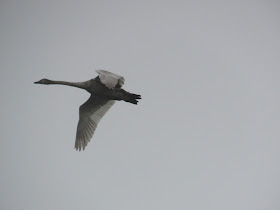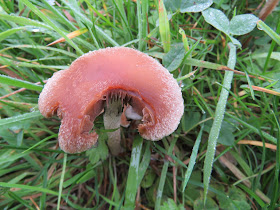Priorslee Lake and The Flash; then Trench Lock Pool and Middle Pool
11.5°C > 16.5°C: Cloud from overnight rain cleared to very far E: mainly fine start with just a few lifted fog patches as low cloud; puffy clouds later. Light SW breeze. Excellent visibility
Sunrise: 07:05 BST
What a difference a day made! Almost no passage today with just a single Lesser Redpoll – my first of the Autumn – as notable overhead
Also unusual was my latest-ever Reed Warbler at the lake
Priorslee Lake: 06:00 – 09:05
(104th visit of the year)
Other notes from today:
- what was presumably the same interloping cygnet was allowed to stay this morning provided it stayed well away from the residents
- checked the rings on all the resident swans: the adults are 7FAD and 7IVT (new or replacement ring on the pen); the juveniles are 7IVS, 7IVU, 7IVV
- the pair of Gadwall seem to have gone again
- the Green Woodpecker was being noisy again
- I counted 39 Pied Wagtails on the football field at 08:55
and
- no moths on the lamps again
As a postscript: a plant I was unsure about on 20 September was not Saw-wort (
Serratula tinctoria). A friend of mine who trained as a biologist tells it is Ploughman's-spikenard (
Inula conyzae) – me neither!
On with today’s bird totals
Birds noted flying over the lake:
- 28 Greylag Geese: inbound
- 47 Canada Geese: 21 (5 groups) outbound; 26 (2 groups) inbound
- 2 Sparrowhawks
- 25 Lesser Black-backed Gulls
- 39 Wood Pigeons
- 212 Jackdaws
- 126 Rooks
- 6 Meadow Pipits
- 6 Pied Wagtails
- 1 Lesser Redpoll
Hirundines etc. seen today
None
Warblers counts: number in brackets = singing birds
- 3 (1) Chiffchaffs
- 1 (0) Reed Warbler
The counts from the lake area
- 2 + 4 Mute Swans again
- 19 (?♂) >> 7(2♂) Mallard
- 16 (5♂) Tufted Ducks
- 1 Grey Heron again
- 1 Little Grebe
- 6 + 8 (2 broods) Great Crested Grebes still
- 10 (4 juveniles) Moorhens
- 128 Coots
- >250 Black-headed Gulls
- 18 Lesser Black-backed Gulls
A touch of mist and golden autumn sun.
A longer view of the morning.
And the sunrise on the vegetation some of which is beginning to turn.
The morning sun provides great lighting on this juvenile Great Crested Grebe.
And here two of the juveniles. one ‘avin a larf?
Exactly what it was really doing was hard to fathom ... until ...
One of the parents arrives with food. Good to see it has brought the greens as well.
A Black-headed Gull with potential food – or so the one in pursuit thinks. Exactly what it is carrying is hard to see (I once saw a House Crow in India carrying a whole popadum – affects the aerodynamics I am sure).
A Long-tailed Tit foraging amongst the hawthorn. It will be catching small insects and spiders and is not interested in the haws.
One of the many Pied Wagtails on the ‘football field’. They seem happy-enough with people, even dogs, wandering around but usually keep their distance. The extent of black on the breast means this is a male.
With an individual as dark as this bird there is never any thought it could be a vagrant White Wagtail from the Continent. When it is not clear-cut a view like this is needed: a White Wagtail would be grey on the uppertail whereas here on a Pied Wagtail the uppertail is even darker than the back.
The haws ready for the arrival of the winter thrushes.
Just a few plants of Meadowsweet / Mead Wort (Filipendula ulmaria) remain.
These are the male catkins of an Alder (
Alnus glutinosa) tree. Not quite sure what they are doing at this date: my books say they appear between February and April.
The more conical catkins on the same Alder are the remnants of this Spring’s female flowers which are now turning in to the small dark cones the seeds in which are favoured by Goldfinches and Siskins.
And to correctly ID this plant from 20 September
Here
Another new plant for me : this is Ploughman's-spikenard (Inula conyzae) – me neither!
A close-up of the flowers
(Ed Wilson)
------------------------------------------------------------------------------------------------------
The Flash: 09:10 – 09:50
(79th visit of the year)
Notes from here
- another Grey Wagtail sighting
- Kingfisher again
and
- I expected the S-facing Ivy near Priorslee Academy school to be buzzing with insects, especially late hoverflies, on a warm sunny morning like today. All I could find were two Garden Spiders (Arameus diadematus)
Birds noted flying over
- 3 Feral Pigeons (1 group) again
- 7 Wood Pigeons
- 1 Pied Wagtail
Hirundines etc. noted
None
Warblers seen or heard here
None
The counts from the water
- 2 + 2 Mute Swans
- 54 Greylag Geese
- 1
Greylag x Canada Goose
- 31 Canada Geese
- 1 white
feral goose
- 30 (19♂) Mallard
- 44 (16♂) Tufted Ducks again
- 2 + 1 Great Crested Grebes
- 6 (3 juveniles) Moorhens
- 10 Coots once more
- 3 Black-headed Gulls
- 1 Kingfisher
(Ed Wilson)
------------------------------------------------------------------------------------------------------
Trench Lock Pool: 10:05 – 10:45 // 11:20 – 11:30
(24th visit of the year)
Notes from here
- the adult Great Crested Grebes seem to have deserted their offspring
- a Kingfisher here as well
and
- several Brown Rats (Rattus norvegicus) around the ramp by the Blue Pig. My first of the year here. The fishermen tell me they are all around the water and at night they have to keep all the bait tight shut and the ‘bivvy’ (bivouac) clean to avoid nocturnal visitations
- 2 Red Admiral butterflies, also my first of the year here
- at least two different species of hawker dragonfly, thought to be Migrant Hawker and Brown Hawker: neither would settle
- a late worker wasp sp. noted
- what seemed to be Field Mushrooms (Agaricus campestris) located
- a gall caused by the Willow Gall Sawfly (Pontania pedunculi) seen
Birds noted flying over here
None apart from the local Jackdaws coming and going
Hirundines etc. noted
None
Warblers counts: number in brackets = singing birds
- 1 (0) Chiffchaff
The counts from the water
- 2 + 8 Mute Swans
- 5 Canada Geese again
- 20 (11) Mallards [also the ‘feral’ bird]
- 6 (2♂) Tufted Ducks
- 1 Grey Heron again
- 1 juvenile Great Crested Grebes only
- 4 (2 juveniles) Moorhens
- 95 Coots
- 22 Black-headed Gulls
- 2 Lesser Black-backed Gulls
- 1 Kingfisher
Plants not checked here today.
One of the cygnets shows the developing white plumage on its wings. We also note that those flight-feathers we can see are now fully-grown.
It is a good trick if you can do it – balance on a barrel. A grey Heron shows how to do it.
The Black-headed Gulls here were flying around and periodically climbing steeply – as shown here. I assume that they were catching insects but I could not see.
I think Brown Rat (
Rattus norvegicus) have great character. Its is hardly their fault they carry all manner of nasty diseases.
Another view.
This specimen was already broken off when I arrived. I am pretty certain it is a Field Mushroom (
Agaricus campestris) and hence eminently edible: but ...
Side view of a whole fruiting body.
And the plan-view.
This gall is caused by the Willow Gall Sawfly (Pontania pedunculi).
(Ed Wilson)
------------------------------------------------------------------------------------------------------
Middle Pool: 10:50 – 11:15
(20th visit of the year)
Notes
- most of the geese somewhere else today
- two juvenile Great Crested Grebes seen
- another ‘largest-ever’ count of Coots for me here
- 1 Grey Wagtail
and
- what seemed to be Field Mushrooms (
Agaricus campestris) located here as well
Birds noted flying over here
- 1 Buzzard
Warblers counts: number in brackets = singing birds
- 1 (0) Chiffchaff again
The counts from the water
- 2 + 5 Mute Swans
- 14 Canada Geese
- 36 (21♂) Mallard [no ‘feral’ birds noted]
- 8 (2♂) Tufted Duck
- 2 Cormorants
- 2 + 2 Great Crested Grebes
- 4 (2 juveniles) Moorhens
- 32 (2? juveniles) Coots
Plants not checked here
A fine view of a juvenile Cormorant. It had been fishing in the pool but decided it did not like my presence and flew in to a tree to dry its wings – or whatever they spread their wings out for: some say to help digestion. Note the inner primary on the left wing is missing and there are several missing feathers and another about to fall out on the right wing.
It shuffled about a bit. Despite being an immature it has a significant area of yellow skin around the base of the bill and, of course, those wonderful ice-blue eyes.
A Grey Wagtail. The pale edges to the secondaries and the blush on the breast-side indicate this is a 1st winter bird.
Another view.
(Ed Wilson)
------------------------------------------------------------------------------------------------------
2011
Priorslee Lake
2 Sky Larks
3 Meadow Pipits
26 Pied Wagtails
7 Siskins
2 Redpolls
142 Greylag Geese
320 Canada Geese
Common Sandpiper
45 Robins
(Ed Wilson)
2010
Priorslee Lake
Cormorant
A pair of Wigeon
220 Coots
Blackcap
Chiffchaff
(Ed Wilson)
2007
RAF Cosford
Juvenile Gannet flew over RAF Cosford at about 100ft
(Martin R Adlam)
2005
Priorslee Lake
3 Redpoll
Siskin
5 Chiffchaffs
Blackcap
Kingfisher
Buzzard
2 Kestrel
Meadow Pipit
(Ed Wilson).


















































